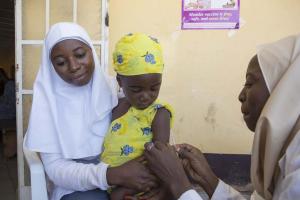Scale-up measures to reduce adverse events and increase immunization uptake in Nigeria
Abuja, 13 June, 2018 - As the women queue up with their children, a team of health workers noticed that a young mother was hesitant to present her child during the last immunization exercise. As one of the health workers reaches out to administer the vaccine to the child, the mother, visibly shaken, yelled “Look at what you did to my child”, showing a scar from an incision on her son’s arm.
The dismayed health worker asked her why she did not report the case to the clinic. “I don’t have money for any medicine or treatment”, she snapped back. “I carried my baby to a native doctor, he gave me powder and leaf to rub on the wound. It did not work. There’s nothing I did not do try to get this child healed to no avail, and now you want to inject my child again?” she shouted.
Childhood immunization is one of the greatest public health success stories. However, the findings of the National Immunisation Coverage Survey 2016 show that nine percent of caregivers do not vaccinate their children because of fear of side effects.
Awareness to minimise panic amongst caregivers
Severe reactions following immunisation are often rare but detecting, reporting and monitoring adverse events following immunization (AEFI) are critical to managing vaccine reactions. Currently, there are ongoing measures to strengthen AEFI surveillance systems. During immunisation campaigns, the number of reported cases increases. Between 2013 and first quarter of 2018, from measles, yellow fever and meningitis campaigns, a total of 12,637 cases were reported with 72 classified as serious AEFI, these were investigated, treated and causality assessment conducted with majority found to be coincidental.
“When a child is vaccinated and parents notice any negative reaction after receiving the vaccine, it is called an AEFI”, Dr Isiaka Ayodeji, Surveillance Officer with World Health Organization (WHO) Nigeria said.
“Parents should not apply any object on injection site after their children have been vaccinated against any of the injectable vaccine preventable diseases. It only exposes the child to an AEFI and other infections”, he added.
Not all AEFIs are vaccine related. Some are results of underlying medical problems. Minor AEFI cases include skin reactions, localised pain, fever, vomiting, headache, and swelling, while in rare cases, AEFIs can be severe and can cause fainting and convulsion.
Dr Ayodeji observed that in rural areas, parents sometimes rub ointments and local medications on their children after vaccination, which is an unhealthy practice.
Combined efforts to ensure standard procedures
Over the past five years, the Federal Government with the support of WHO is strengthening the AEFI surveillance system in the country. The Nigerian government through the Ministry of Health first inaugurated AEFI National Expert Committee (NEC) in 2012. The committee meets on a quarterly basis to review and classify adverse events following immunization and advises government on appropriate actions to be taken amongst others.
“We know that through efforts and deliberations from this committee, Nigerian health workers will be able to monitor and prevent cases of AEFI,” Dr Kabir Yusuf, of the National Primary Health Care Development Agency (NPHCDA) said. “The government is very committed in ensuring that these interventions continue to reassure the general population of the safety and efficacy of vaccines for the benefit of the people.” He added.
On its part, WHO is ensuring that all health workers are properly trained to handle vaccines in a professional manner, such that no programmatic errors occur.
“In addition, WHO supports strengthening of AEFI monitoring and reporting systems and prompt causality assessments to ensure severe AEFIs are promptly addressed”, Dr Fiona Braka, WHO Nigeria Team Leader for Expanded Programme on Immunization (EPI) stated.
Dr Braka also opined that it is important for caregivers to report incidents of AEFI as soon as detected so that cases can be managed early, and properly. Timely investigations and intervention measures should also be applied to prevent future occurrences of AEFI and generally improve immunization systems.
Kindly follow us on Social Media:



